Sharing books together has been shown time and time again to be one of the most beneficial ways to help your child develop literacy skills. You, as a parent, are the most important influence on your child’s learning, and there are so many things families can do at home to help children be successful with literacy. Listed below are just some of the ways that you can develop your child’s language and literacy skills at home! These skills can be taught from before your child starts school and can continue on as they develop their literacy abilities.
- Read, Read, Read!
Make a habit of reading to your child every day! Sharing books and reading together is the one thing that has the most impact on your child’s ability to learn to read. Reading to your child from an early age teaches them that this is can be an exciting part of their daily routine and encourages a love of reading. Mem Fox, author and educator, believes that children need to hear 1000 books before they begin to read themselves. This is easy to achieve if you begin when your child is a baby, but much harder if you wait until they begin school.
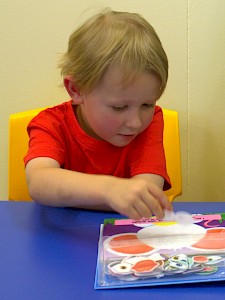
- Re-read your favourite stories!
Mem Fox suggests sharing three books with your child each day; a new one, one you have read before and an old favourite that your child has heard many, many times. Children learn through repetition. Hearing a story a number of times allows your child to understand the story, link the words to the pictures, understand the rhythm and flow of the words and predict what comes next. Prediction in an important skill used by fluent readers and by children in their every day lives. Encourage your child to fill in words in familiar stories to help develop their prediction skills.
- Explore all kinds of texts!
Stories are fantastic for exposing your children to written language in a fun and engaging way, but there are so many other options available to us as well. Look out for all the different types of texts they can explore; letters, magazines, postcards, menus, newspapers, advertisements, signs, brochures, shipping lists, birthday and Christmas cards, recipes, instructions, the list goes on! Share these different reading and writing experiences with your child and talk about them together.
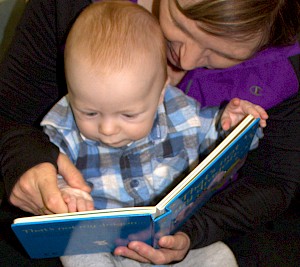
- Talk, talk, talk!
Reading and writing are skills that are based in language. This means that it is important to have good language skills before developing literacy, learning to read and write. Talking to your child as much as you possibly can during your daily activities is one way to encourage language skills. Vocabulary (the number of words your child understands and can use) is particularly important for developing literacy. The size of a child’s vocabulary and how many words they know is often the difference between a good reader and a child who has difficulties with this. Talking about books as you look at them is a great way to develop vocabulary and teach children words that they may not come across in day-to-day life.
- Talk about how books work
Teach your child about books! Talk about the cover, how to hold the book and turn the pages, the title and how it gives clues as to what is inside. Talk about the pictures on each page and how the words tell us about what we see. Help them understand that we start a book at the first page and work towards the end. Show them how we read a page - starting top to bottom and left to right. Look at all these things in lots of different books; no two books are exactly the same! Encourage your child to feel confident around books.
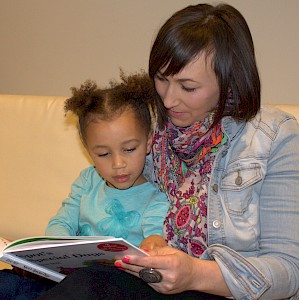
- Talk about sounds
Talk about all the different sounds your child might hear in their day-to-day life. Sing songs, tell rhymes and listen to music and audiobook stories! Talk about all the different sounds in words, in your child’s name. What sounds are at the beginning and end? What other words have those sounds? Clap out syllables and count them, talk about long and short words. Talk about how rhyming words sound the same, read rhyming stories and pick the rhyming words, make up your own silly rhymes! Play I Spy!
- Talk about words and letters.
Words are everywhere in our world, look out for them and talk about them with your child! Count the letters in the words and look and long vs short words. Talk about the sounds that the letters make. Look at alphabet books and help your child understand that letters have names and sounds. ‘B’ is called “bee” but makes a “buh” sound. Cut out letters and paste them to make your very own alphabet book. Look for the letters in your child’s name when you are out and about, see where you can find them. Find common words and see if you can pick them out in books that you are reading. “The” looks the same each time we see it, see if your child can find it in books and in their world.
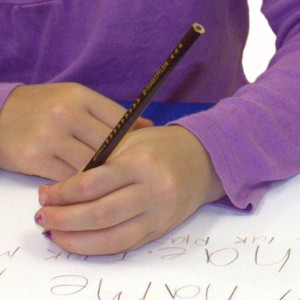
- Talk about stories
Talk about the different parts of stories. Stories always have a beginning and an ending and the people in them often have to figure out a problem. Talk about how, in stories, we know who is talking by using things like ‘he said’. Stories use feeling words to help us understand what is going on. Retell stories just from looking at pictures. Make up your very own stories to share!
- Talk about what you read.
When reading together, talk to your child about the story to help develop their comprehension. What’s going on in the story? What do you think about the characters and how they reacted? How do you think they are feeling? What might happen next?
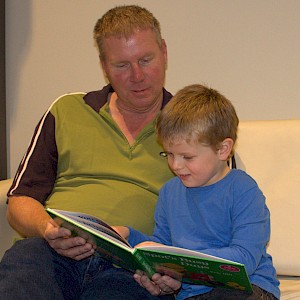
- Fun for the whole family!
Make reading, writing and talking about books part a family activity – get everyone involved! Let your child see you and other members of the family reading and writing in lots of different scenarios, and encourage them to talk about what you are doing. Involve them in activities like opening the mail, writing letters, cards and lists. Give them lots of opportunities to play with books, pencils, paper and other drawing/writing materials. Have a family trip to the local library and pick out books to read together. Show interest in all attempts at reading and writing, encouraging these skills.
If you have any concerns about your child's communication development, including speech sounds, language or literacy development be sure to act quickly to obtain the support your child needs. Contact your local speech pathologist for support. If you'd like to contact us please don't hesitate to email or phone one of our team members for assistance.
Related Blog Posts
If you liked this post you may also like:
Problem solving
Developing writing while on school holidays
Is my child's speech lazy?
Developing play



